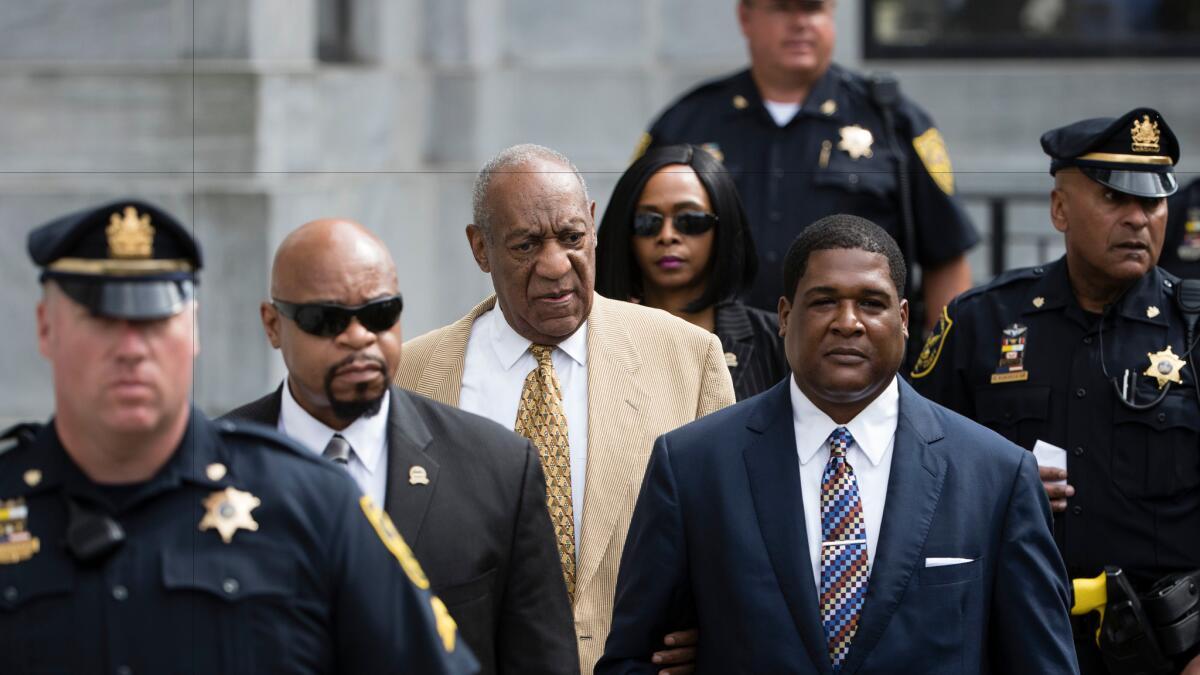Bill Cosby’s accuser does not have to testify before trial, judge rules

- Share via
Reporting from Norristown, Penn. — In a rebuff to Bill Cosby, a judge has ruled that the entertainer’s accuser won’t have to take the stand before Cosby’s trial on sexual assault charges begins.
The ruling streamlines the process by which Cosby’s case will reach a trial and limits the opportunity for the defense to garner information from — or exert influence over — a key prosecution witness before the trial.
The judge said that in making his ruling he was adhering to a legal precedent in Pennsylvania that accusers are not required to testify at pretrial hearings. “The [prosecution] does not have to present live witnesses,” the judge, Steven T. O’Neill, said. “Hearsay evidence shall be sufficient.”
Cosby has been charged in Montgomery County with three felony counts of aggravated indecent assault as a result of a 2004 incident at his home here in the suburbs north of Philadelphia. The prosecution contends that the entertainer assaulted Andrea Constand, a former Temple University basketball team employee, without her consent while supplying her with wine and a pill.
The case is the first instance in which Cosby has faced criminal charges after dozens of women stepped forward in the past two years to accuse him of sexual assault.
The prosecution had kept Constand off the witness stand during a preliminary hearing in May, instead relying on prior statements for its case.
The prosecution won that hearing and Cosby was ordered to stand trial. His lawyers on Thursday essentially were appealing that ruling. They sought to reopen the preliminary hearing and compel Constand to testify — or to have the charges dismissed entirely — in what experts say was both a legal gambit and part of a larger effort to defer a trial.
At issue Thursday was a Pennsylvania rule of criminal procedure enacted in 2013 that established that pretrial proceedings are exempt from the 6th Amendment requirement that a defendant be able to confront his or her accuser. That rule was challenged in a 2014 case involving David Ricker, a Pennsylvania man accused of aggravated assault and attempted murder of a state trooper, with the judge there affirming the pretrial exception. O’Neill on Thursday was citing that precedent in making his ruling.
Constand is expected to take the stand when the Cosby trial begins, setting up the first public showdown between the actor and an accuser. But prosecutors wanted to keep Constand off the witness stand in the pretrial phase so as not to expose her testimony to the defense.
“It’s our position we’re not going to retraumatize victims,” Dist. Atty. Kevin Steele said in court, offering another a more judicially persuasive rationale. “If they want to confront the witness, they can confront her at trial.”
The defense team, led in court Thursday by Los Angeles attorney Christopher Tayback, argued that the 2013 rule did not comprehensively exempt an accuser from testifying before a trial and that Cosby’s due process rights were violated without such testimony.
“Cross-examination has been tried and tested and proven to be probably the best device for determining the merits in a dispute,” Tayback said. “That’s really all we’ve been asking for.”
Though he dubbed it “a very difficult call,” O’Neill often seemed skeptical of the defense’s claims. “I guess I’m trying to understand your perspective on how due process was violated,” he said to Tayback at one point.
Cosby often looked pensive as he learned back in his chair, his hand on his mouth or chin. During breaks, he frequently engaged in conversation with members of his team. The actor, who turns 79 next week, appeared frail as he walked through the courtroom, holding an aide’s arm and carrying a wooden cane.
The stakes are high at the Cosby legal proceedings here. Many of his accusers see the Constand case as a rare opportunity for justice; the statute of limitations in many of the other incidents have run out.
The proceedings Thursday also involved deposition testimony from a 2005 civil suit that the prosecution used to help make its preliminary-hearing case — and which the defense said it will try to suppress at trial.
The details, some of them graphic, help address the key question of whether Constand was sufficiently aware of her circumstances to provide consent and offered a glimpse of what is likely to be a key issue at the trial.
O’Neill has been chosen to preside over that trial. But other motions could delay that process.
After the ruling, Cosby’s lead counsel, Brian McMonagle, faced reporters outside the courthouse and said he planned to appeal Thursday’s decision to Pennsylvania’s highest court.
Steele said defense attorneys already had delayed the trial for too long: “They’re saying they want to confront the witness. Let’s go to trial and confront the witness.”
ALSO
John Cho’s Sulu is Star Trek’s first openly gay crewmember
Read Beyonce’s open letter in response to the deaths of Alton Sterling and Philando Castile
More to Read
Sign up for Essential California
The most important California stories and recommendations in your inbox every morning.
You may occasionally receive promotional content from the Los Angeles Times.











